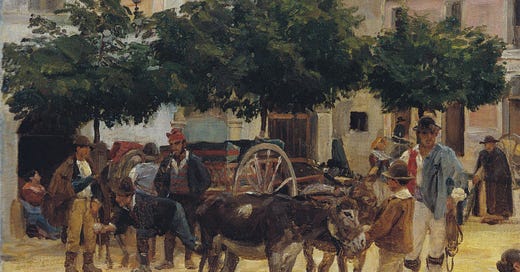"Crotone, Italy" by novelist George Gissing, 1897
"There was but one vehicle at the station, a shabby, creaking, mud-plastered sort of coach, into which I bundled together with two travellers."
In his book By the Ionian Sea, English novelist George Gissing tells of his “ramble” in Southern Italy in 1897, including arriving by train in Crotone (Cotrone).
There was but one vehicle at the station, a shabby, creaking, mud-plastered sort of coach, into which I bundled together with two travellers of the kind called commercial—almost the only species of traveller I came across during these southern wanderings. A long time was spent in stowing freightage which, after all, amounted to very little; twice, thrice, four, and perhaps five times did we make a false start, followed by uproarious vociferation, and a jerk which tumbled us passengers all together. The gentlemen of commerce rose to wild excitement, and roundly abused the driver; as soon as we really started, their wrath changed to boisterous gaiety. On we rolled, pitching and tossing, mid darkness and tempest, until, through the broken window, a sorry illumination of oil-lamps showed us one side of a colonnaded street. “Bologna! Bologna!” cried my companions, mocking at this feeble reminiscence of their fat northern town. The next moment we pulled up, our bruised bodies colliding vigorously for the last time; it was the Albergo Concordia.
A dark stone staircase, yawning under the colonnade; on the first landing an open doorway; within, a long corridor, doors of bedrooms on either side, and in a room at the far end a glimpse of a tablecloth. This was the hotel, the whole of it. As soon as I grasped the situation, it was clear to me why my fellow travellers had entered with a rush and flung themselves into rooms; there might, perchance, be only one or two chambers vacant, and I knew already that Cotrone offered no other decent harbourage. Happily I did not suffer for my lack of experience; after trying one or two doors in vain, I found a sleeping-place which seemed to be unoccupied, and straightway took possession of it. No one appeared to receive the arriving guests. Feeling very hungry, I went into the room at the end of the passage, where I had seen a tablecloth; a wretched lamp burned on the wall, but only after knocking, stamping, and calling did I attract attention; then issued from some mysterious region a stout, slatternly, sleepy woman, who seemed surprised at my demand for food, but at length complied with it.
From By the Ionian Sea by George Gissing, 1899, available on Amazon*
Classic Travel Tales on Facebook
*As an Amazon Associate we earn a bit from qualifying Amazon purchases.
Image: The Square Outside the Albergo del Liri at Sora by Joakim Skovgaard, 1884, ARoS Aarhus Kunstmuseum, public domain.



